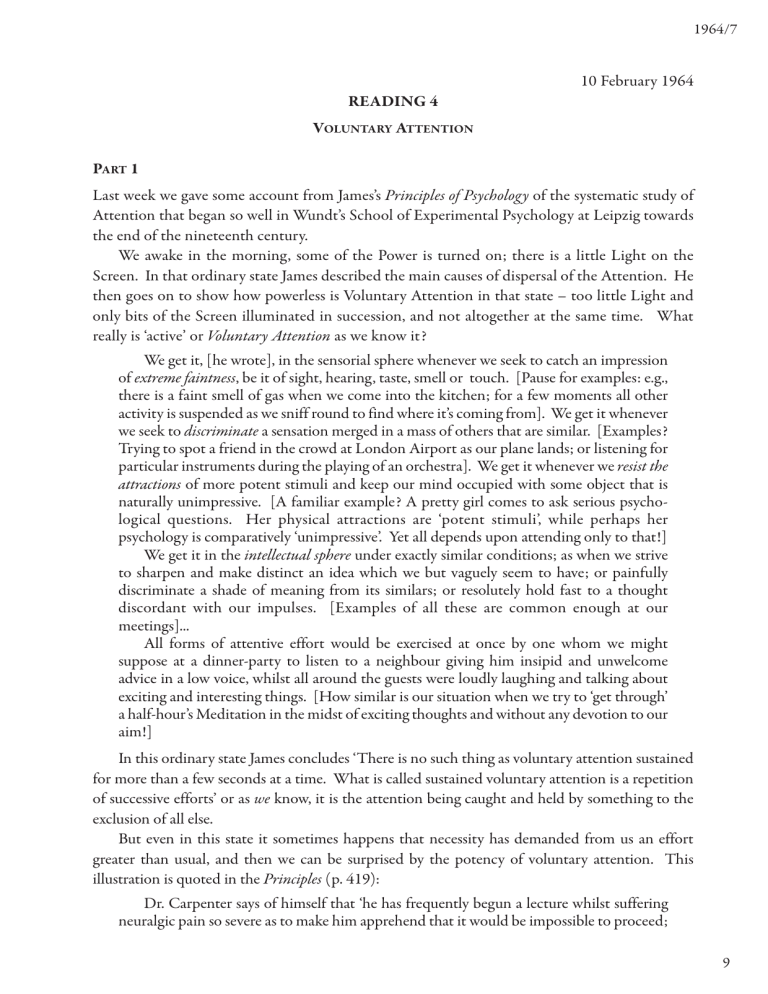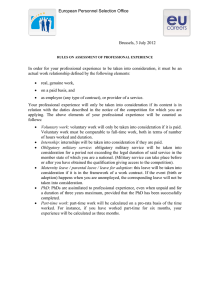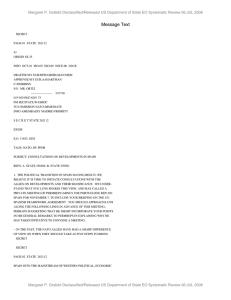
1964/7 10 February 1964 READING 4 VOLUNTARY ATTENTION PART 1 Last week we gave some account from James’s Principles of Psychology of the systematic study of Attention that began so well in Wundt’s School of Experimental Psychology at Leipzig towards the end of the nineteenth century. We awake in the morning, some of the Power is turned on; there is a little Light on the Screen. In that ordinary state James described the main causes of dispersal of the Attention. He then goes on to show how powerless is Voluntary Attention in that state – too little Light and only bits of the Screen illuminated in succession, and not altogether at the same time. What really is ‘active’ or Voluntary Attention as we know it? We get it, [he wrote], in the sensorial sphere whenever we seek to catch an impression of extreme faintness, be it of sight, hearing, taste, smell or touch. [Pause for examples: e.g., there is a faint smell of gas when we come into the kitchen; for a few moments all other activity is suspended as we sniff round to find where it’s coming from]. We get it whenever we seek to discriminate a sensation merged in a mass of others that are similar. [Examples? Trying to spot a friend in the crowd at London Airport as our plane lands; or listening for particular instruments during the playing of an orchestra]. We get it whenever we resist the attractions of more potent stimuli and keep our mind occupied with some object that is naturally unimpressive. [A familiar example? A pretty girl comes to ask serious psychological questions. Her physical attractions are ‘potent stimuli’, while perhaps her psychology is comparatively ‘unimpressive’. Yet all depends upon attending only to that!] We get it in the intellectual sphere under exactly similar conditions; as when we strive to sharpen and make distinct an idea which we but vaguely seem to have; or painfully discriminate a shade of meaning from its similars; or resolutely hold fast to a thought discordant with our impulses. [Examples of all these are common enough at our meetings]... All forms of attentive effort would be exercised at once by one whom we might suppose at a dinner-party to listen to a neighbour giving him insipid and unwelcome advice in a low voice, whilst all around the guests were loudly laughing and talking about exciting and interesting things. [How similar is our situation when we try to ‘get through’ a half-hour’s Meditation in the midst of exciting thoughts and without any devotion to our aim!] In this ordinary state James concludes ‘There is no such thing as voluntary attention sustained for more than a few seconds at a time. What is called sustained voluntary attention is a repetition of successive efforts’ or as we know, it is the attention being caught and held by something to the exclusion of all else. But even in this state it sometimes happens that necessity has demanded from us an effort greater than usual, and then we can be surprised by the potency of voluntary attention. This illustration is quoted in the Principles (p. 419): Dr. Carpenter says of himself that ‘he has frequently begun a lecture whilst suffering neuralgic pain so severe as to make him apprehend that it would be impossible to proceed; 9 1964/7 yet no sooner has he by a determined effort fairly launched himself into the stream of thought, than he has found himself continuously borne along without the least distraction, until the end has come, and the attention has been released; when the pain has recurred with a force that has over-mastered all resistance, making him wonder how he could ever have ceased to feel it.’ (Voluntary Attention being so fleeting, certain things can only be done by ‘launching oneself by a determined effort’. Have you any examples?) * PART 2 Now all those examples are common-place and they all deal with specific elements of attention in our ordinary state. What we are wanting is something quite different. We want to develop special methods of rousing a state of attention which is non-specific – attention for attention’s sake. Just being in a state of Attention. I think you’ll make a big discovery if you do this systematically. It means more Power, more Light (i.e. more emotional drive) and an extra part of the Screen brightly illuminated (that is, the cortex of the prefrontal lobes behind the forehead). Here is an example of what is meant: ‘I am driving the car along a familiar road, having previously taken the necessary steps to be in a good state of attention; feeling rather gay! My whole field of view is bright and clear and I’m also aware of my body and of how well or badly the car is running. I don’t require to attend to anything in particular; everything gets done by the well-trained machine whether or not I keep this front part of the Screen bright. There are no thoughts in my field of Attention. ‘But suddenly the Light there goes out, without my knowing it of course! Yet other parts of the Screen are still being illuminated. Have I not gone through all the appropriate motions – swerved to avoid an oncoming car that’s over the white line; avoided a stray dog on the road; come to a halt in my correct lane at the lights? I realise now that my attention has returned, that my field of vision had been totally blanked out all that time. I had ceased to be aware.’ What caused it? I recall getting lost in a train of thought about the person I was going to see. The machine carried on, though I was no longer there to know it. In conclusion: The idea of Systematic Attention is not a new one; it is nearly ‘as old as the hills’. Here is a quotation from the Lord Buddha who used, as you remember we were told, this very same system of Meditation as ours: Monks†, I know not of any other single thing so apt to cause the arising of distorted points of view, if not yet arisen, or their increase if already arisen, as unsystematic attention. In him who gives not Systematic Attention, distorted views if not yet arisen do arise, or if already arisen do increase. Monks, I know not of any other single thing so apt to cause the arising of Truth if not yet arisen, or the increase of Truth if already arisen, as Systematic Attention. Suppose, Monks, the seed of sugar-cane or paddy or grape be planted in moist soil. Whatsoever essence it derives from earth or water, all that conduces to its sweetness, †NOTE: ‘Bhikkus’, those under discipline. 10 1964/7 pleasantness, and delicious flavour when mature. What is the cause of that? The happy nature of the seed. Just so, Monks, in a man of right view (through Systematic Attention) all intentions, aspirations and resolves, all activities whatsoever, conduce to the pleasant, the dear and delightful, the profitable, in short to happiness. What is the cause of that? Monks, it is his happy view.’ (From the Book of the Gradual Sayings, Ch.17, ‘The Seed’.) *** 11 1964/









